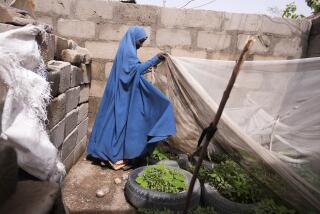Africa’s Child Servants Face Bleak Prospects
- Share via
ABIDJAN, Ivory Coast — Wearing their best cotton dresses, a dozen girls sit on benches sucking at small bags of frozen juice on the edge of a busy market.
Ranging from 14 to 23, they have come from across Ivory Coast in search of jobs as cooks, nannies and maids in one of West Africa’s largest, most prosperous, cities.
“We are here to help our sisters who want to find work,” declares Justin Gboko, an agent who finds jobs for the girls. “Not for other things,” he adds darkly.
Gboko’s agency and others like it have become the focus of uncomfortable attention since reports on Africa’s trade in child slaves hit the headlines.
Mariam Toure was 11 when an aunt collected her from a northern village and dropped her off at a stranger’s home in another town.
Up at 6 a.m., she worked every day washing dishes, running errands and taking care of a 2-year-old, finishing around 10 p.m.
Mariam’s employer paid the aunt every month--she does not know how much--but neither Mariam nor her mother received any money.
Now 19 and living with a sister in Abidjan, Mariam is finally job-hunting in her own right.
“I have nothing. Otherwise I wouldn’t be here,” she says sadly.
Most of the girls recount similar experiences. Some have been beaten, few get regular time off and many have difficulties getting paid. But they keep hoping for better.
There are no signs advertising Aly’s Establishment in the crowded and impoverished Adjame neighborhood, but it’s known as the place to go for domestic help.
The agency insists it does not deal with traffickers--that the girls, all Ivorian, make the approach.
A girl presents herself, clutching a bag holding her few belongings. She is welcomed by a friendly man who asks what kind of work she is looking for and how much money she wants. She is then invited to join the others on the benches.
From time to time, prospective employers arrive to survey the girls. Introductions are done by the agents, but the girls negotiate their own salaries--$20 to $50 a month.
The employer leaves the agent with a $7 fee and an address in case a relative comes looking for the girl.
UNICEF and others are working with the agencies to improve the girls’ work conditions.
At Aly’s Establishment, agents photocopy and distribute a pamphlet on children’s rights produced by a local aid group.
Agent Tanoh Oi Tanoh shrugs, describing his work as a “necessary evil.”
“People will always need someone to work for them,” he says, “and the girls need work.”
More to Read
Sign up for Essential California
The most important California stories and recommendations in your inbox every morning.
You may occasionally receive promotional content from the Los Angeles Times.













